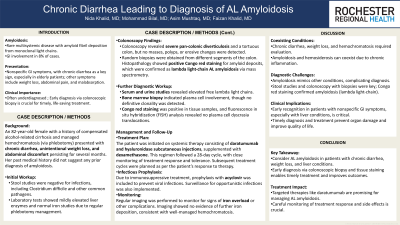Monday Poster Session
Category: Colon
P1974 - Chronic Diarrhea Leading to Diagnosis of AL Amyloidosis
Monday, October 28, 2024
10:30 AM - 4:00 PM ET
Location: Exhibit Hall E

- FK
Faizan Khalid, MD
St. Vincent's Hospital
Toledo, OH
Presenting Author(s)
Nida Khalid, MD1, Faizan Khalid, MD2, Mohammad Bilal, MD1, Asim Mushtaq, MD3
1Rochester General Hospital, Webster, NY; 2St. Vincent's Hospital, Toledo, OH; 3Rochester General Hospital, Rochester, NY
Introduction: Chronic Diarrhea Leading to Diagnosis of AL Amyloidosis
Case Description/Methods: Background: AL amyloidosis is a rare disorder characterized by the deposition of amyloid fibrils derived from monoclonal light chains. Gastrointestinal involvement, though uncommon, can present with nonspecific symptoms such as chronic diarrhea, weight loss, and abdominal discomfort.
Case:
An 82-year-old female with a history of compensated alcohol-related cirrhosis and hemochromatosis(managed by phlebotomy) presented with chronic diarrhea, abdominal discomfort and unintentional weight loss. Stool assessment ruled out infections. A colonoscopy was performed, revealing a tortuous colon with severe pan-colonic diverticulosis. Notably, there were no abnormalities such as masses, polyps, or erosive changes in the colon. Random biopsies taken during the colonoscopy showed amyloid deposits, later confirmed as AL amyloidosis (lambda type) through mass spectrometry.
Further investigations revealed elevated levels of free lambda light chains in the urine and serum, indicating active lambda light chain amyloidosis. Bone marrow biopsy findings were suggestive of plasma cell involvement without definitive clonality. Congo red staining confirmed amyloid deposits in the tissues, with FISH analysis showing no common plasma cell dyscrasia translocations.
Management: The patient was initiated on systemic therapy consisting of daratumumab and hyaluronidase subcutaneous injections, supplemented with dexamethasone, following a 28-day cycle regimen. Subsequent cycles were planned accordingly based on the treatment response and tolerance.
Infectious prophylaxis was included in the management plan, with acyclovir prescribed for viral prevention. Surveillance for iron overload continued, with imaging showing no evidence of iron deposition.
Discussion: This case underscores the importance of considering amyloidosis in elderly patients with chronic diarrhea, particularly those with underlying liver conditions such as hemochromatosis. While hemochromatosis and amyloidosis are not directly causally related, they can coexist due to shared risk factors like chronic inflammation and immune dysregulation. Early diagnosis through comprehensive evaluations like colonoscopy and appropriate tissue sampling is crucial for initiating timely and targeted treatment, which can significantly impact patient outcomes.
Disclosures:
Nida Khalid, MD1, Faizan Khalid, MD2, Mohammad Bilal, MD1, Asim Mushtaq, MD3. P1974 - Chronic Diarrhea Leading to Diagnosis of AL Amyloidosis, ACG 2024 Annual Scientific Meeting Abstracts. Philadelphia, PA: American College of Gastroenterology.
1Rochester General Hospital, Webster, NY; 2St. Vincent's Hospital, Toledo, OH; 3Rochester General Hospital, Rochester, NY
Introduction: Chronic Diarrhea Leading to Diagnosis of AL Amyloidosis
Case Description/Methods: Background: AL amyloidosis is a rare disorder characterized by the deposition of amyloid fibrils derived from monoclonal light chains. Gastrointestinal involvement, though uncommon, can present with nonspecific symptoms such as chronic diarrhea, weight loss, and abdominal discomfort.
Case:
An 82-year-old female with a history of compensated alcohol-related cirrhosis and hemochromatosis(managed by phlebotomy) presented with chronic diarrhea, abdominal discomfort and unintentional weight loss. Stool assessment ruled out infections. A colonoscopy was performed, revealing a tortuous colon with severe pan-colonic diverticulosis. Notably, there were no abnormalities such as masses, polyps, or erosive changes in the colon. Random biopsies taken during the colonoscopy showed amyloid deposits, later confirmed as AL amyloidosis (lambda type) through mass spectrometry.
Further investigations revealed elevated levels of free lambda light chains in the urine and serum, indicating active lambda light chain amyloidosis. Bone marrow biopsy findings were suggestive of plasma cell involvement without definitive clonality. Congo red staining confirmed amyloid deposits in the tissues, with FISH analysis showing no common plasma cell dyscrasia translocations.
Management: The patient was initiated on systemic therapy consisting of daratumumab and hyaluronidase subcutaneous injections, supplemented with dexamethasone, following a 28-day cycle regimen. Subsequent cycles were planned accordingly based on the treatment response and tolerance.
Infectious prophylaxis was included in the management plan, with acyclovir prescribed for viral prevention. Surveillance for iron overload continued, with imaging showing no evidence of iron deposition.
Discussion: This case underscores the importance of considering amyloidosis in elderly patients with chronic diarrhea, particularly those with underlying liver conditions such as hemochromatosis. While hemochromatosis and amyloidosis are not directly causally related, they can coexist due to shared risk factors like chronic inflammation and immune dysregulation. Early diagnosis through comprehensive evaluations like colonoscopy and appropriate tissue sampling is crucial for initiating timely and targeted treatment, which can significantly impact patient outcomes.
Disclosures:
Nida Khalid indicated no relevant financial relationships.
Faizan Khalid indicated no relevant financial relationships.
Mohammad Bilal indicated no relevant financial relationships.
Asim Mushtaq indicated no relevant financial relationships.
Nida Khalid, MD1, Faizan Khalid, MD2, Mohammad Bilal, MD1, Asim Mushtaq, MD3. P1974 - Chronic Diarrhea Leading to Diagnosis of AL Amyloidosis, ACG 2024 Annual Scientific Meeting Abstracts. Philadelphia, PA: American College of Gastroenterology.
